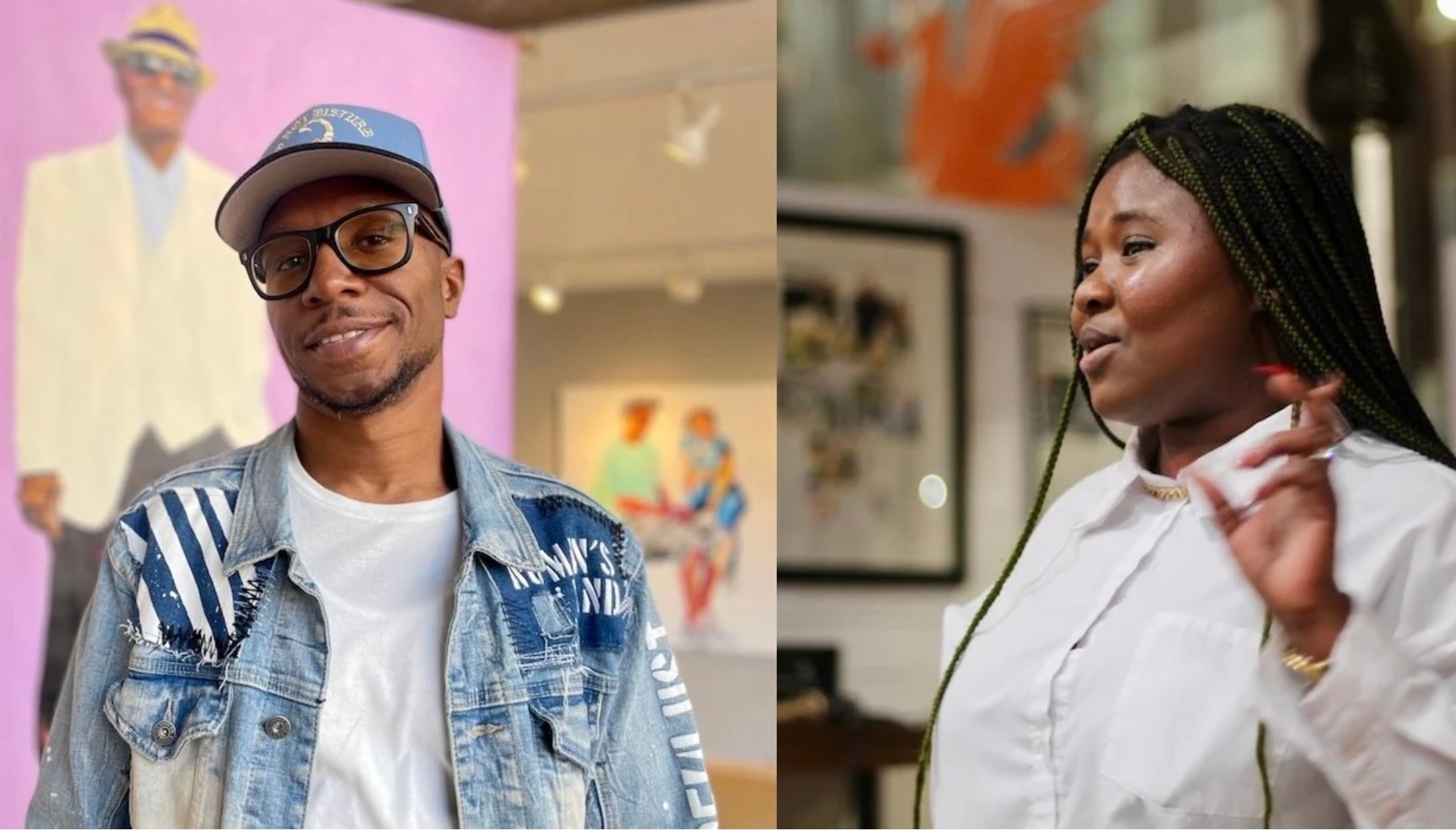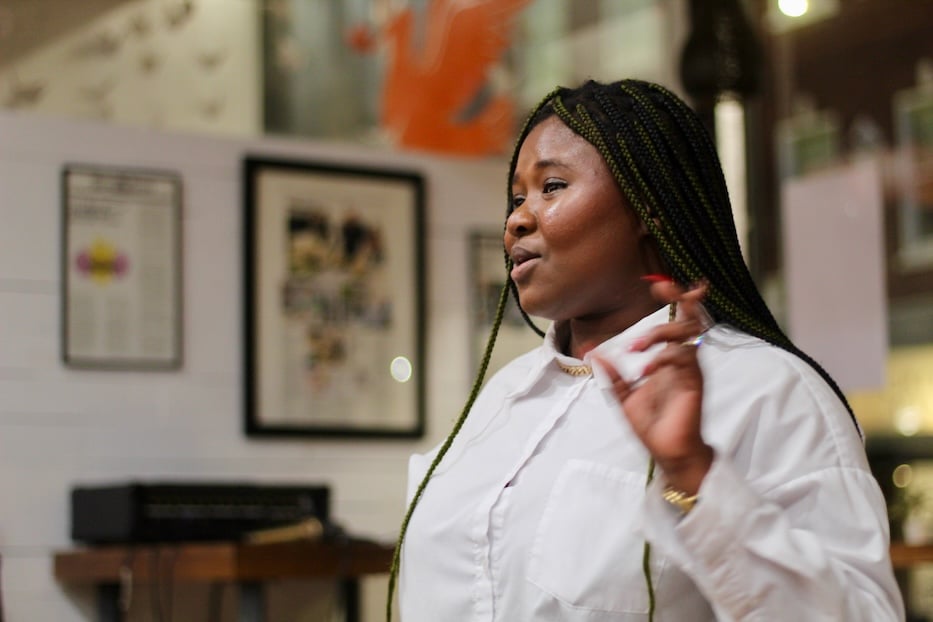
Culture & Community | Frances "Bitsie" Clark | Arts & Culture

Frances "Bitsie" Clark. Matthew Garrett Photo.
The following citizen contribution was submitted by Mimsie Coleman on behalf of the Bitsie Clark Fund for Artists. The fund, which was established to support artists in 2018, currently includes an advisory committee with members Mimsie Coleman, Kim Futrell, Robin Golden
Stacy Graham-Hunt, Winter Marshall, Betty Monz, and Maryann Ott. Barbara Lamb was also instrumental in founding the fund.
Frances "Bitsie" Clark, the unique powerhouse who helped build the arts in New Haven, passed away at 93 earlier this month. Her spirit and her legacy, including the grants awarded in her name, will live on for years to come.
That's the hope of the Bitsie Clark Fund for Artists (The Bitsie Fund), founded in 2018 with a mission to continue Clark's commitment to artists in greater New Haven. The fund offers grants to individual artists to pursue a specific goal or project while at a turning point in their work. Each year since 2018, including during the Covid-19 pandemic, two selected artists have received $5 ,000 grants.
This year, grantees include artists Marquis Brantley and Thabisa Rich. As the fund prepares to celebrate them next week, it will also change administrative hands from its founding members to the Arts Council of Greater New Haven, the non-profit where Clark served as Executive Director for 20 years.
“I am honored to welcome the Bitsie Fund grant program into the Arts Council family," said Arts Council Executive Director Hope Chávez. "It is a gift to continue stewarding Bitsie’s legacy here at the Arts Council for Greater New Haven in the most Bitsie way possible, backing artists’ visions. This partnership marks the first permanent grant program at the Arts Council, though certainly not the last!"
"Thank you to Bitsie’s children, Mary and Jonathon, and the extraordinary Bitsie Chicks for trusting us with this program.”
Before Clark's death earlier this month, Bitsie Fund member Mimsie Coleman visited her to describe this year’s awardees, sharing relevant narratives, photos and videos. Clark's response? “Wonderful. They are wonderful. They are perfect.”

Brantley at Creative Arts Workshop earlier this year. Lucy Gellman File Photo.
They are "wonderful" and "perfect" indeed. A son of New Haven, Brantley is a self-taught visual artist. He was inspired to draw at a young age by his older brother, the photographer Jay Brantley, who loved to close himself in his room and draw what Marquis remembers as “colorful, vivid images.”
Seven years ago, he made a more serious commitment to paint. While “I never expected great success,” he found it, first in a group show during last year's open studios on Audubon Street, and then in a solo show at Creative Arts Workshop (CAW) in February 2025. CAW Executive Director Trina Learned, who was taken by the work from the moment she saw it, praised Brantley for the sensitivity, force and vulnerability with which he paints. His solo exhibition, Made Visible: Unveiled Roots, remains one of the most successful during her tenure.
For Brantley, Made Visible was transformative. In the exhibition, the artist presented portraits of Black men and boys in a tribute to his family members and some well-known public figures who “have influenced me to become the person I am today,” he said. The portraits, rendered in a realistic, modern style, capture the likenesses of his subjects and reveal a depth to their characters.
“Marquis’ opening was one of the best ever, and the exhibition was incredibly successful,” Learned said. During its month-long run, Brantley made himself available to meet with visiting groups—artists and students especially—excited to share his images of Black men as strong and successful and as possible role models. It was his goal, he said, to connect with individuals and with the community.

Ezekiel Jaymar Brantley (Lost Tooth).
When asked, Learned recalled one of her favorite moments from the show, in which Brantley was in the gallery meeting with a kindergarten class. One child had a meltdown, lying on the floor and refusing to get up. Brantley’s response was to lie down next to the child and suggest they view the art from that vantage point.
Before long, all of the kindergarteners had joined them on the floor. It provided a different perspective and a moment of connection.
“It [Made Visible] gave me the confidence to know that my work can touch many lives," Brantley said. "It deepened my desire to share the stories of Black men and boys and to address the political issues of our time.” Marquis now describes himself: “I’m a 41-year-old, early-career Black artist trying to make art my full-time profession.”
The Bitsie Clark Fund for Artists supports his goal.

Thabisa Rich leading a gathering for artists at Havenly in 2023. Lucy Gellman File Photo.
Singer-songwriter Thabisa Rich was born and raised in Kwazakele, South Africa, where she fell in love with and absorbed the sounds of African music.
She sang throughout her youth, originally in a church choir, later branching out to other music genres, which led to her becoming a backup singer for jazz and African pop bands. When she started writing music in her 20s, her songs were defined by African beats, rhythms, language and spirit, and were interspersed with words, including English, from other cultures.
Rich's solo career was launched when she was 28 years old and reached the Top 18 contestants on "Idols South Africa." The next year, her video was nominated for a Best Video award at the South African Traditional Music Awards. Two albums and a South African tour followed.
Since relocating to the U.S. with her husband, Rich has continued singing, songwriting and giving wide-ranging performances, from small New York jazz clubs to the International Festival of Arts and Ideas and throughout a 2023 Northeast tour. Vibrantly dressed onstage with a voice that is both powerful and sultry, she performs emotive songs that are completely her own. Her music has been described as a blend of Black jazz, African pop, soul and funk. She calls it African soul and world music. She wants to connect with the world.
Since moving to New Haven, Rich has received numerous honors, and has been active in the New Haven community. Employed as the City of New Haven’s Community Outreach Coordinator, she also founded a nonprofit, the Rich Arts Collective, designed “to connect community through art, music and conversation that will link us to humanity and lead to understanding of our cultural differences.”
Rich's current project, which she says is her “most transformative body of work,” aims to do just that. It combines an album—her first since leaving South Africa—and a tour to directly connect with others. It will bridge her South African roots with her current life in the U.S., will incorporate additional languages and will be centered around the concept of "Agape," which she defines as “a form of community love involving selfless and unconditional love for others.”
“This is more than a creative goal,” she said. “It’s a mission. I want it to reflect not only who I am as an artist today, but who I am becoming, and to give others—especially women, immigrants and members of the African diaspora—space to see themselves in sound, in survival and in song.”
It is a story Rich has carried her whole life. “And now,” she says, “I have the voice, skill and vision to tell the truth. As a Black woman and immigrant artist, I’ve often been told I had to be more — do more — to be seen. This album says I’m enough. It honors where I come from and offers a space for others to do the same.”
The Bitsie Clark Fund for Artists will support Thabisa’s Agape project.
For more on both artists, check out their interviews on WNHH Community Radio, embedded above.

